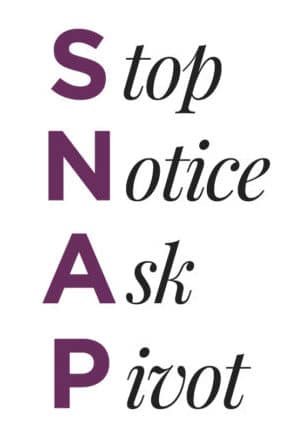4 Simple Steps to Stay Self-Aware, Even During the Craziest Day Ever
After conducting an in-depth study of seventy-two high-performing CEOs, Cornell University researchers reached a surprising conclusion. The key predictor of success for leaders wasn’t grit, focus, education, decision-making skills, a knack for strategic planning, or even IQ. It was self-awareness.
Many experts would say self-awareness is simply the ability to monitor and regulate our thoughts, feelings, and actions (and the effect they have on ourselves and others). I half agree. In my experience cultivating and practicing self-awareness requires we identify and challenge the bogus unconscious beliefs underlying the ways we think, feel, and act.
While writing my book The Road Back to You, I devised a practice to help people surface and neutralize their self-limiting beliefs. Based on the acronym SNAP, this practice has helped me wake up to know when self-limiting beliefs have taken the helm of my life. Here’s how SNAP works.
1. Stop
Every four hours, a notification comes up on my iPhone reminding me that it’s time to stop for two or three minutes to give my full attention to whatever’s happening in my life at that precise moment. Sounds easy, right? Forget it. Everything in our frenzied, goal-oriented world militates against pausing even for a few minutes to switch off autopilot, and consciously come home to ourselves. But we can.
To stop, take four or five deep, prayerful breaths to ground yourself in your body and return to the present moment. The purpose of this step is simply to wake up and bring your awareness back to your immediate experience.
2. Notice
Often we get swept up in the rush of daily activities and habitual reactive behaviors, but rarely do we step back to observe and learn from them. Once we’ve come to a full stop, we look around to see what we’ve been missing while we were lost in our thoughts or absorbed in our work.
Is the environment around us calm, or burning to the ground? How are we connected to what’s going on? Are we personally in a good space, or do we notice we’re caught up in outmoded, habitual perspectives and behaviors?
Whatever you discover, make sure as you notice or observe what you’re feeling, thinking, and doing in the moment that you do so with compassion! No labeling, analyzing, criticizing, or trying to fix anything. Your job right now is to simply notice, nothing else.
3. Ask
Now that you’re awake to what’s happening in the moment, you can ask yourself three questions that will expose any self-limiting beliefs and get you back on track if you need it. Let me illustrate how these questions work with an example from my own life.
Once, while working against a tight book deadline, I came down with a case of writer’s block. I stared at the blank page on my computer screen for hours until I became an anxious wreck.
Then the notification on my iPhone came up reminding me to stop and practice SNAP. Stopping work was the last thing I wanted to do given how far behind I was, but I yanked myself away from my computer, and asked myself the first question: “What am I believing right now?”
This is a powerful question. After only a few minutes of quiet reflection, the unconscious beliefs fueling my anxiety and writer’s block surfaced.
- “Everyone from my agent to my dog will feel irreversibly disappointed in me if this book doesn’t hit a bestseller list.”
- “People only value me for my work and accomplishments in life, not for who I am, so this book better be a masterpiece.’”
-
“The world only loves people who succeed. No one loves a loser.”
How’s that for crazy thinking? Is it any wonder my creative well dried up when beliefs like these were swimming just beneath the waterline of my consciousness? Depending on your particular work, you can probably substitute any number of other bogus notions you might harbor any given day or hour.
I then asked myself the second question, “Are these beliefs true?” Of course, not! As a therapist, I know these perceptions are rooted in old personal narratives and have no basis in reality. This doesn’t mean the archaic scripts of our past don’t occasionally get loose and wreak a little havoc in our lives.
Finally, the third: “How would my life change if I let go of this belief?” This last question wasn’t hard for me to answer. Once free from these over-exaggerated, fear-based beliefs I could write the book I was supposed to write rather than feel the paralyzing pressure to write the next War and Peace.
4. Pivot
And that’s what I did. Once I’d identified and interrupted the circuit on my bogus beliefs I was able to pivot and make different, healthier, more helpful choices that were in line with the truth. Not long after I practiced this SNAP exercise I was able to get back to work and made my deadline, albeit with minutes to spare!
 It’s impossible to overstate how important it is for leaders to grow in self-awareness, to recognize and challenge their mistaken unconscious beliefs which, left on their own will undermine their best efforts to become the healthiest version of themselves.
It’s impossible to overstate how important it is for leaders to grow in self-awareness, to recognize and challenge their mistaken unconscious beliefs which, left on their own will undermine their best efforts to become the healthiest version of themselves.
“Your beliefs become your thoughts, your thoughts become your words, your words become your actions, your actions become your habits, your habits become your values, your values become your destiny.”
Need I say more?
Disclosure of Material Connection: Some of the links in the post above are “affiliate links.” This means if you click on the link and purchase the item, we will receive an affiliate commission. Regardless, we only recommend products or services we use and believe will add value to our readers. We are disclosing this in accordance with the Federal Trade Commission’s 16 CFR, Part 255: “Guides Concerning the Use of Endorsements and Testimonials in Advertising.









